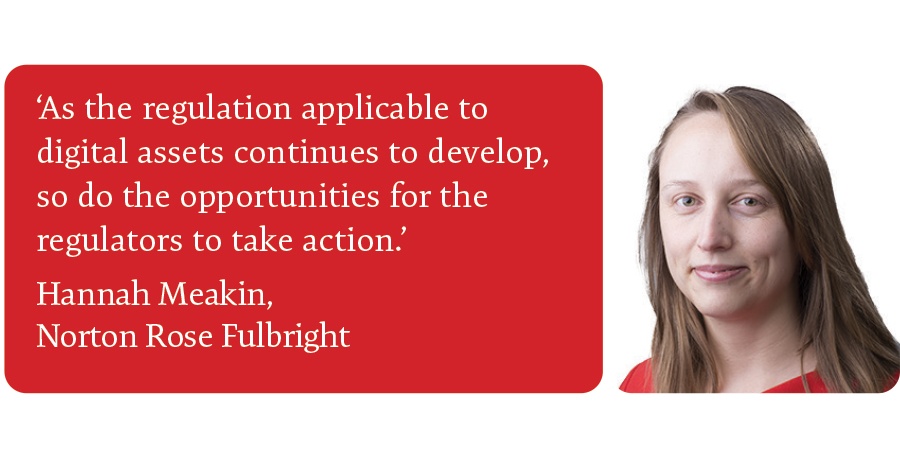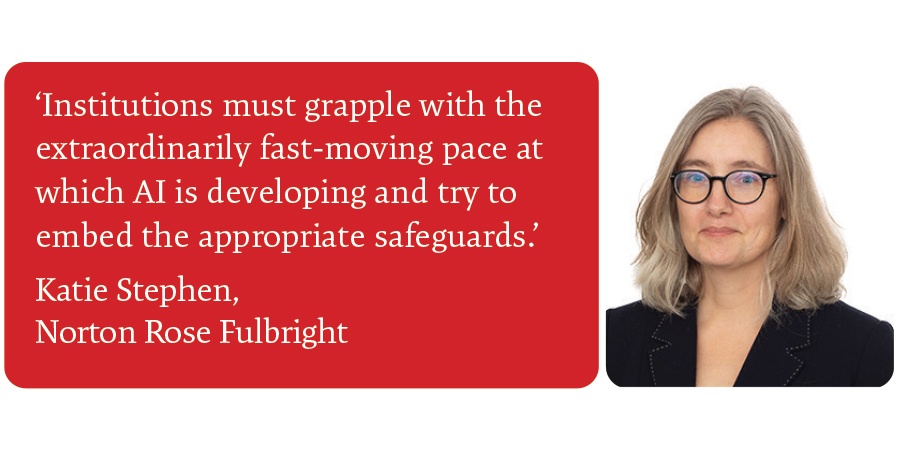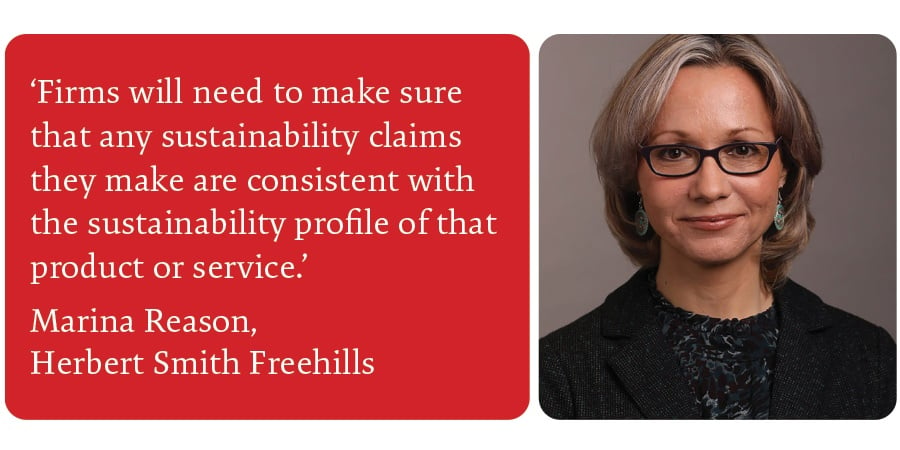Nearly a year after joining the Financial Conduct Authority as CEO in 2020, Nikhil Rathi committed to making the organisation ‘more innovative, assertive and adaptive’. Two years later, some of this change is evident – particularly in its leadership.
Former Herbert Smith Freehills partner Ashley Alder became Chair of the FCA Board in February 2023, after more than a decade as CEO of the Hong Kong Securities and Futures Commission (SFC). Meanwhile Therese Chambers, who began her City career as a commercial litigator, and former National Crime Agency director Stephen Smart took up their new posts as joint executive directors of Enforcement and Market Oversight shortly after, in April.
But while the leadership team has changed, questions still remain around how much progress has been made towards meeting Rathi’s goals and what any revamped organisation would look like in practice.
According to Katie Stephen, co-head of Norton Rose Fulbright’s contentious financial services group in London, Alder has joined the FCA at ‘a critical moment’.
In the post-Brexit era, when UK authorities have been steadily exerting pressure on regulators to change the landscape, Stephen believes Alder’s appointment is significant ‘not just because he joins at a time of a wave of new regulation but also from an internal cultural perspective given reports from last year regarding staff turnover’.
Alder himself stepped into the shoes of former Slaughter and May partner Charles Randell OBE, who stepped down as FCA chair earlier than anticipated, explaining in a letter to prime minister Rishi Sunak that he believed it was ‘the right time to hand over the oversight of the rest of the transformation programme to a Chair who can see it through to completion’.
Stephen anticipates that Alder will now ‘be keen to keep the momentum going with forthcoming regulatory change across sectors, whilst steadying the ship’.
Raza Naeem, a financial regulatory partner at Linklaters, has high hopes that Alder will be able to ‘bring more of an international perspective to the table’, citing his past experience as CEO of the SFC in Hong Kong as a particular positive given the UK’s need to ‘have its own rules which work in an international context’.
Regulatory change
It isn’t just the organisation’s leadership that’s changed though. The hotly anticipated new Consumer Duty came into effect in July 2023 and requires FS companies to act in good faith, avoid foreseeable harm and support customers in their financial objectives. Although financial institutions with direct retail or consumer customers have long been expected to achieve fair outcomes for them, the Consumer Duty radically alters the scope of this obligation, by extending it to firms that don’t have direct contractual relationships with customers, but who are in a distribution chain ending in a retail customer or where they are able to determine, or materially influence customer outcomes.
This extension means it now captures the overwhelming majority of FS institutions.
Norton Rose Fulbright’s Matt Gregory, who worked as a senior policy adviser at the Treasury before joining the firm as a financial services regulatory partner, believes that this change ‘requires a challenging new way of thinking and doing business’.
As an example, he highlights that the new rule that ‘all products and services provided to retail customers must provide fair value requires a holistic assessment of costs to a customer in accessing, using and enjoying the benefits of a product across the product lifecycle’.
According to the FCA, the Consumer Duty ‘sets higher and clearer standards of consumer protection across financial services, and requires firms to put their customers’ needs first’. In practice, Naeem argues that this means it ‘should be something firms live and breathe and think about proactively’. Gregory echoes this sentiment, suggesting that his clients ‘should now be embedding the Duty culturally within their organisations’. He argues that over the coming months they will need to focus on testing and monitoring outcomes in practice.
Given the ongoing economic challenges, high interest rates and cost of goods, banks and other financial services institutions need to pay particular attention to borrowers in financial difficulty, ensuring that they have robust policies and processes in place to identify and record vulnerability characteristics.
By summer 2024, institutions will need to have been awarded their first annual certification, confirming that they have acted to deliver good outcomes. In order to achieve this, Gregory recommends that firms ‘really put themselves in the retail customers’ shoes, and consider non-financial costs, as well as financial costs to customers when undertaking value assessments’.
Enforcement
On the enforcement side, the picture is still relatively cloudy. Therese Chambers and Stephen Smart, who joinly replaced Mark Steward as executive director of enforcement and market oversight, have a host of experience between them. Chambers has both retail and wholesale experience and has been at the FCA for more than 20 years. Smart meanwhile joined from the National Crime Agency so between them Chambers argues they have ‘all bases covered’.
For Nick Queree, a senior counsel in Slaughter and May’s disputes and investigations group, however, the change of directorship means ‘there will be a question around – as ever – resourcing and the conduct the FCA wants to target’. According to partners Steward’s time in office was characterised by an aggressive approach from the regulator, with a rapid increase in the number of formal investigations over his seven years in post. According to Rathi his tactics delivered: ‘significant enforcement cases across a broad spectrum, as well as the FCA’s data-led approach to market oversight’. Others though criticised backlogs in the system, with open investigations dragging on, leaving firms, individuals and regulators waiting for outcomes. Queree, therefore, suggests that under Smart and Chambers ‘greater focus might be appropriate’.
Whether Chambers and Smart will adopt a different approach – perhaps focusing on drawing out key themes and turning the tap down on volume – remains to be seen. While Chambers emphasised in a recent speech that the team will ‘appreciate and reward firms that do the right thing’, many partners are taking Smart’s appointment as an indication that there is likely to be a renewed focus on the criminal side. As Queree suggests, Smart may: ‘want to use criminal prosecutions to send messages to the market about the kind of conduct the FCA is worried about’.
For now, institutions must remain vigilant, with Stephen warning that they should be ‘mindful of the importance of immediate remedial action, as we are seeing a constant pipeline in internal investigations work across all sectors – from retail lending issues to international fraud’. In a climate where financial institutions are expected to manage significant regime changes, such as the Consumer Duty and Appointed Representatives Regime, as well as a cost of living crisis impacting both businesses and consumers, Stephen argues that: ‘it has never been more important for firms to ensure they are able to respond swiftly to intervention to mitigate or avoid referral to enforcement’.
Regardless of the exact approach Chambers and Smart end up taking towards investigations, some topics will undoubtedly dominate activity over the coming years. ESG is the buzzword across the board, and while environmental considerations are typically given the most prominence, Queree notes that ‘one development practitioners are seeing more of is claims around the S and the G, in particular cases on the governance side where claimants are holding entities to account around disclosure failings’.
Given the growing body of US securities law cases taking root in the UK – exemplified by the SFO’s investigation of Glencore’s practices across a number of African nations – a future in which regulatory resolutions could also regularly give rise to mass shareholder claims seems plausible.
Stephen, too, is keen to emphasise the fact that ‘good governance will remain a key focus for the financial services regulators and therefore for firms going forward’. She argues that it is therefore vital for banks and other FS organisations to ‘ensure the appropriate governance processes are in place and embedded throughout the business as this is key to identifying and responding to issues in a timely and effective manner’. According to Stephen taking this action now should mitigate against any ‘intervention and/or enforcement action for prolonged or repetitive breaches’.
The other space for financial services players to keep a sharp eye on is technology, with developments from AI to cryptocurrency coming under ever-closer scrutiny from regulators. Hannah Meakin, a fintech-focused financial services regulation partner at Norton Rose Fulbright, highlights that ‘as the regulation applicable to digital assets continues to develop, so do the opportunities for the regulators to take action where they see behaviour that undermines their objectives’.
In a recent example of such expansion, June 2023 saw Parliament pass the Financial Services and Markets Act 2000 (Financial Promotion) (Amendment) Order, bringing cryptoassets within the scope of rules which regulate the marketing of financial products in the UK. For other areas, in particular AI, there is still some lag, as policymakers are left rushing to keep up with rapid evolution in the sector.
A white paper published by the Department for Science, Innovation and Technology in March 2023 appears to endorse a pro-innovation approach to AI regulation – tying in with Rathi’s hopes for the FCA – but concrete principles and initial implementation guidance to regulators have yet to be issued. In the meantime, practitioners such as Stephen point out that ‘whilst this guidance will (eventually) be welcome by institutions, they must continue to grapple with the extraordinarily fast-moving pace at which this sector is developing and try to embed the appropriate safeguards within their governance framework to address any new risks or challenges presented by AI’.
The approach to developments in technology – which attempts to strike a balance between embracing new developments and providing adequate consumer protections – can be seen as emblematic of the current state of play, with innovation and assertiveness both guiding regulatory policy.
Exactly how Alder and Rathi will steer the FCA through these rocky waters still remains to be seen, but practitioners are keen to emphasise the need to think ahead, anticipate impact on consumers, and shore up internal procedures. As Queree points out in relation to the Consumer Duty, ‘if you haven’t thought about it now, you’re too late’. It’s a sentiment that applies across the board in these fast-moving times.
All eyes on the rising tide of ESG
Jemima Marshall takes a closer look at the ESG tsunami facing the financial services sector.
Navigating the evolving landscape of ESG (Environmental, Social and Governance) requirements has rapidly crept up the list of priorities for financial institutions. ‘As financial regulatory lawyers, we are there to scan the horizons for what is coming through the legislative books. There was no doubt that ESG was going to be a gamechanger in the financial services industry, and this has certainly been the case’, says Ashurst financial regulatory partner Lorraine Johnston.
What does the current ESG landscape look like?
Marina Reason, a partner in the financial services regulatory practice at Herbert Smith Freehills, identifies one of the key drivers as being governments’ carbon emission commitments. ‘These provide a political impetus to legislate in a way that ensures the economy, including financial services, is aligned with these commitments’, she says.
But the global energy crisis, aggravated by the Russo-Ukrainian War and the subsequent shutdown of gas supplies into Europe, combined with the collective concern surrounding climate change means that ‘there has been an increase in uncertainty when it comes to meeting zero-net targets,’ according to Linklaters’ financial regulatory partner Raza Naeem.
‘Europe has set the mark, with The European Commission’s (EC’s) Action Plan on Sustainable Finance in 2018’, says Johnston, who highlights that ‘this must be contrasted to the UK, especially as the relapse in focus on ESG becomesmore evident’, further supported by the PM’s recent net-zero U-turn.
According to Reason, the rate, drive and ambition of Europe is one of the reasons why financial institutions in the UK are increasingly focusing on sustainability. It isn’t the only explanation though. Reason also points to: ‘growing pressure from stakeholders and shareholders to focus on sustainability, in addition to brand reputation and customer loyalty, which puts pressure on financial institutions to take ESG more seriously’.
E, S and G
While to date there has arguably been more focus around the E of ESG, this is now shifting. As Naeem highlights: ‘we are seeing an increasing focus on all three elements of ESG. Until now, the ‘E’ has been the focal point, with a strong emphasis on climate change, supported by initiatives including the EU Sustainable Finance Disclosure Regulation (SFDR) and the EU Taxonomy. We are now seeing issues beyond climate change, such as biodiversity, deforestation and supply chain, being taken into consideration.
There has also been a shift in focus to include social issues (‘S’), including human rights, treatment of employees and wellbeing, in addition to supply chain practices. EU regulators have proposed the CSRD (Corporate Sustainability Reporting Directive), which will require companies to outline and report on the impact of corporate activities on the environment and society. Initially, financial institutions may encounter challenges with this according to partners, as sector-specific standards were postponed by the European Financial Reporting Advisory Group (EFRAG), but there is expected to be additional guidance on existing standards.
The financial services sector should also look out for the Corporate Sustainability Due Diligence Directive (CSDDD), which is still being debated by EU legislators, according to Reason, who adds that it will: ‘require some financial institutions to look closely at their value chains and conduct due diligence of their suppliers and clients, focusing on all environmental issues and human rights. This will require implementation and a lot of operational changes’.
Horizon scanning
On the governance front, there is a growing focus on transparency, with increased scrutiny from regulators in both the UK and the EU, on how financial institutions are implementing their ESG strategies and prudential frameworks. European financial institutions will need to consider taxonomy alignment reporting and non-financial sustainability disclosures (CSRD) from January 2024. ‘The primary piece of upcoming ESG rules in the UK will be the Sustainability Disclosure Requirements (SDR)’, Reason highlights. ‘These rules will bring in sustainability labels and different disclosures. They are not dissimilar to the EU’s SFDR, but there are important nuances which will make it difficult for firms with global compliance models’.
Elsewhere, ‘there is an appetite to incorporate sustainability into the heart and the core of financial services firms’, says Johnston, ‘but this is tempered by cautionary statements surrounding greenwashing’, whereby organisations are at risk of making misleading environmental claims.
Measures proposed by the Financial Conduct Authority (FCA) aim to hinder exaggerated or unsubstantiated claims surrounding ESG credentials. ‘While the FCA may say the anti-greenwashing rule is nothing new, and that firms are already required to communicate to clients in a way which is clear, fair and not misleading, firms will need to make sure that any sustainability claims they make are consistent with the sustainability profile of that product or service’, says Reason.
Another key consideration are the challenges around the lack of data supporting the requirements of reporting. These are starting to be measured, as ‘the UK Government looks to bring ESG data and rating providers within the scope of regulation, something which needs addressing’, says Naeem.
There are also calls for more standardisation in ESG regulation to eradicate a patchwork of country-specific requirements.
Increased regulation and market expectations are all driving pressure on financial institutions to better manage ESG risks. ‘We are gradually moving away from passive disclosure to more active obligations and a holistic approach, including obligations in respect of risk management and transitioning planning’, Reason concludes. Against this backdrop, keeping track of the ever-changing landscape, engaging with legislators and regulators in Europe and the UK, while implementing coherent strategies in line with an organisation’s own risk appetite, will be key for financial services players in creating and maintaining a strategic approach to sustainability.



